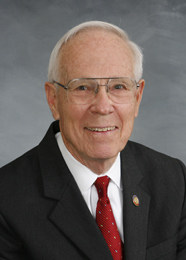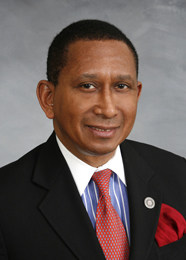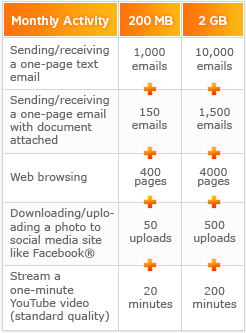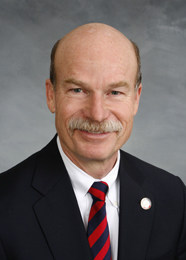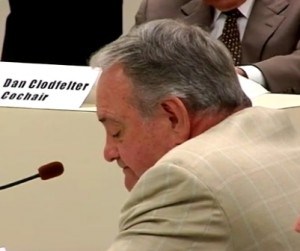
Senator Hoyle turns his back on consumers and reads from his industry-provided talking points to stop municipal broadband
[Phillip Dampier co-authored this piece.]
North Carolina communities seeking to provide Internet access to their residents would have to wait a year while legislators argue over their terms of entry under a revised bill that swept through the Senate Finance Committee yesterday on a voice vote.
S1209, originally a poison pill bill that would effectively kill municipal broadband projects, was revised into a demand for further study, accompanied by a one-year moratorium for any city contemplating its own broadband project.
That concerns officials in several cities across the state, especially Greensboro, who wants to preserve the option of municipal broadband should Time Warner Cable revisit an Internet Overcharging experiment attempted in 2009 which would have drastically limited broadband usage for its customers.
The bill’s passage with a calling of the “yeas and nays” made it impossible for members of the public to know who voted for and who voted against the compromise measure. But an accidentally open microphone allowed many to get a real sense of how much one member of the Committee disliked consumers fighting back against telecom special interests pulling all the strings.
Senator Daniel Clodfelter (D-Mecklenburg) nearly raised a toast to his fellow members during the session praising them for doing the “grown-up” thing and agreeing to his manufactured compromise that phone and cable companies are celebrating as a victory today:
“This is not, I would say to you, a peace treaty. It is an armistice. And what the bill does is provide an armistice so that the shooting war stops and a conversation will occur among those people who’ve been meeting with each other in those conference rooms for the past week,” Clodfelter said. “Thank you all, because you did the grown-up thing, and I really appreciate it.”
Clodfelter’s seemingly-sincere comments might have gone off better had the audience not heard Clodfelter’s private remarks to Senator Dan Blue (D-Wake) a few minutes earlier, inadvertently captured by a live microphone:
“The — what I call the crazies that circulate around this issue are not gonna like this,” Clodfelter told Blue.
Observed WUNC reporter Laura Leslie: “I’m sure Clodfelter isn’t the first lawmaker to think so, but most of them cover the microphone before they say it out loud.”
The bill’s author, Senator David Hoyle (D-Gaston), who spent the day mangling the words “fiber optic,” condescendingly lectured his colleagues and communities about their opposition to his bill. Mistakenly called a Republican in the pages of the Greensboro News-Record, Hoyle complained cities don’t belong in the broadband business. He doesn’t want government competing with private industry, which might explain why the newspaper switched his party affiliation. But considering the amount of telecom special interest money that has flowed into the retiring senator’s campaign coffers, there may be much more to this than a philosophical debate.
Hoyle has gone all out in the North Carolina media on behalf of his telecom industry benefactors.

Money makes legislators do strange things... like disrespect their constituents with obvious industry-backed protectionist legislation
Delivering a series of eyebrow-raising one-liners, Hoyle is hardly ingratiating himself with cities and towns across the state. He inferred most city and town leaders were naive, telling ENC Today he expects all of the attention on municipal broadband will only cause more municipalities to get into the business.
“There are a whole lot of cities that can’t wait to jump on the bandwagon — monkey see, monkey do,” Hoyle said, using language that some have since called inappropriate.
Hoyle argues these systems are destined to fail. Once again he called out the cities of Davidson and Mooresville completing required upgrades to an old Adelphia cable system the community acquired nearly three years ago.
“There’s a couple of cities in this business that they should sure wish the heck they were not into, and that’s Davidson and Mooresville,” Hoyle said.
That came as news to MI-Connection, the municipal provider providing service to the two communities, whose revenues for the quarter that ended March 31st were up 9.4 percent from a year earlier.
Davidson resident and MI-Connection board member John Venzon told the Davidson News he’s worried that the legislation could “unlevel the playing field” for MI-Connection and make it harder to compete.
MI-Connection General Manager Alan Hall also told the News the entire board has concerns about these kinds of bills.
Hoyle and his telecommunications industry friends may wish the communities weren’t in the business, but MI-Connection believes otherwise.
As Stop the Cap! has reported on several occasions, MI-Connection’s challenges have hardly been unique to Davidson and Mooresville. Time Warner Cable ditched over 125 Adelphia systems it purchased, and the company is still coping with legacy equipment left in place at the former Adelphia system it now runs in Calabasas, California. The cost of upgrades for the old Adelphia systems kept by both Time Warner Cable and Comcast ran well into the millions.
Another messy misstep for the state senator has been what one could charitably call “stretching the truth.”
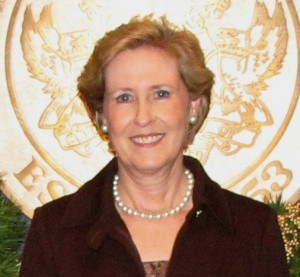
Mayor Susan Kluttz, representing the people of Salisbury, N.C., was called a "gentleman" and "he" by an out of touch David Hoyle
“I got a call from a gentleman yesterday, Mayor Kluttz from Salisbury, and I mean he laid me out. He called me dumb. I had no idea,” Hoyle complained to other members on the Senate Finance Committee.
One person who was not amused by that story was Salisbury Mayor Susan Kluttz, who was seated directly in front of Hoyle. She had no idea what Hoyle was talking about. I later spoke with a representative of the city who told me no one from their staff called Hoyle. With a mistake like that, maybe that phantom caller was onto something after all. Listening to Hoyle, the self-appointed expert on municipal fiber projects, refer to them as “fiber opticals,” “fiber opt,” “fiber install and do all the things they’re going to do,” and “totally fiber project any city,” did not inspire confidence.
At the heart of Hoyle’s opposition is the idea that local municipalities should not be involved in the private sector… ever. In his mind, broadband service is a luxury, and the private marketplace is best equipped to decide who gets it, and who does not. Hoyle brings no answers to the table for communities bypassed by the duopoly of providers who are increasingly focusing their time, attention, and resources on larger cities where average revenue per customer can be higher than in rural areas. If the local cable or phone company doesn’t provide the service, that’s just too bad.
Mirroring the attitude of the state’s telecommunications companies, Hoyle believes municipalities or even private providers that seek broadband stimulus money represent unfair competition, even in cases where existing providers refuse to offer service.
That is the ultimate dilemma. If you believe broadband is not becoming an essential component of most American lives and is simply a nice thing to have, it’s not insane to agree with Hoyle. But hundreds of thousands of North Carolina residents don’t believe that. Parents of children in broadband-disadvantaged schools quickly learn their kids fall behind their peers in larger, wired communities. Businesses will not locate in areas where inadequate broadband exists. Digital economy entrepreneurs cannot start new businesses without good broadband either. Even senior citizens, who are among the most resistant to broadband adoption, often complain about the inherent inequity of being forced to rely on dial-up service.
Some of the same arguments about disparity of access went on during the early 1900s in rural North Carolina, deprived of electricity and telephone service by private providers. Once President Roosevelt effectively declared these types of services as essential utilities, where private providers didn’t go, municipalities and co-ops did. In North Carolina, keeping the brakes on an expansion-minded state government came even before Roosevelt was president, with the passage of the 1929 Umstead Act — a law that prohibits the state from directly competing with private enterprise.
The Umstead Act has been seized on by the telecommunications industry, arguing municipal broadband violates the spirit of the law, even though it never applied to local municipalities. Besides, the law has been amended since 1929 because, free market theory notwithstanding, free enterprise doesn’t have every answer and cannot meet every need. Just ask BP.
Only Ayn Rand could appreciate that Hoyle and his allies support an entrenched duopoly that embraces its profitable urban customers while they fight for restraining orders like S1209, blocking efforts by others to deliver service the duopoly won’t provide. We call that corporate welfare and protectionism. But some in the state legislature can’t see that because of the blizzard of cash being dropped in front of them by that duopoly, just to leave things entirely in their hands.
Hoyle noted nobody, including himself, liked the final bill. In Hoyle’s eyes, that adds up to a “good bill.”
Other members on the Committee had different views to share.
Senator William Purcell (D-Anson, Richmond, Scotland, Stanly) is the former mayor of Laurinburg — the same city from the 2005 court victory in BellSouth/AT&T v. Laurinburg, which paved the way for municipal broadband in the state. He asked pointedly, “What assurances do we have that the private companies are going to provide [service] to smaller areas?”
Hoyle answered by pulling out his talking points generously provided by the cable and phone companies and delivered a non-answer, finally stating, “we are not going to get broadband to everyone in the state.” Perhaps Hoyle is foreshadowing his next job after he retires from the Senate — working for the same telecom companies he seems to represent now.
Senator Joe Sam Queen (D-Avery, Haywood, Madison, McDowell, Mitchell, Yancey) delivered the most passionate presentation of the day on behalf of his constituents, among the least likely to have broadband service available to them. As Hoyle disrespectfully rolled his eyes and winked at the cable industry lobbyists in the audience, Queen blasted the industry’s record of performance in his district, which covers the High Country — the rural Appalachian mountain counties in the western half of the state.
“We don’t have last mile access in the mountains,” Queen told the Committee. “[My constituents are] frustrated that it’s not getting done by the cable companies, the network companies, whoever’s doing it. They’re just cherry-picking and leaving off so many of our citizens, and that’s just unacceptable.”
Queen noted the private industry that refuses to serve many of his areas also refuses to allow others to provide that service.
“The private sector is not getting it done fast enough,” he added. “We have electricity to everybody, we have water to everybody. We should have Internet to everybody in the 21st century. In my counties, we are still struggling to make that happen. Our children don’t have the virtual broadband educational opportunities that they have in the urban areas. Our business owners don’t have the access to markets that our urban citizens have.”
One senator had a question about the year-long moratorium. Senator Floyd B. McKissick, Jr. (D-Durham) asked if no action was taken by the end of the 2011 session, would the moratorium expire automatically? Although provisions in S1209 do provide for a firm sunset date, Paul Myer from the North Carolina League of Municipalities told me nothing precludes the Senate from quietly extending the moratorium, or removing the sunset provision altogether, effectively making the ban permanent.
Meanwhile, communities contemplating such projects would have to give 15-days written notice to every private provider potentially impacted, providing more than two weeks for a fear-based opposition propaganda campaign. And we know where they’ll get the money to pay for it, too.
The only good news out of all this:
- Cities already providing or constructing broadband projects may continue;
- A Google Fiber city in North Carolina gets a pass;
- Federal broadband grant recipients may proceed, although many of those grants are going to existing providers anyway;
- The bill is headed next to the House, where we have a new opportunity to derail it.
Recognizing the spirit of this entire proceeding which left consumer interests out in the cold, no public comments were heard and no recorded vote was taken.
Needless to say, the revised S1209 is only slightly less loathsome than the original, and must be opposed. But more on that coming shortly.
We couldn’t close this piece without recognizing that when all the talk was over and vote was taken, it was rest and relaxation time for selected senators, brought to you by Electricities who picked up the tab for a fabulous spread of food and drink. WUNC reporter Laura Leslie wrote about what she called an Irony Supplement.
The S1209 compromise also won the grudging support of Senator David “Business-Friendly” Hoyle (D-Gaston).
After telling Senate Finance that “Somebody, maybe a lot of bodies, needs to stand up for our free enterprise system,” Hoyle went on to knock the state’s biggest public utility co-op: “If anybody thinks that the experiment with Electricities was a resounding success, I’d like for you to raise your hand.”
No one did.
But after session today, quite a few of the Hons found their way across the street for free food and drinks provided by – wait for it – Electricities.
As one House Republican told me tonight, “If you can’t bash them and then eat their hors d’oeurves, you’re in the wrong business.”
No, sir, I’m not. But I’m thinking you might be.
Senate Finance Committee deliberations on a revised S1209, a bill to establish a one year moratorium on municipal broadband projects. (June 2, 2010) (34 minutes)
You must remain on this page to hear the clip, or you can download the clip and listen later.
<
p style=”text-align: center;”>


 Subscribe
Subscribe